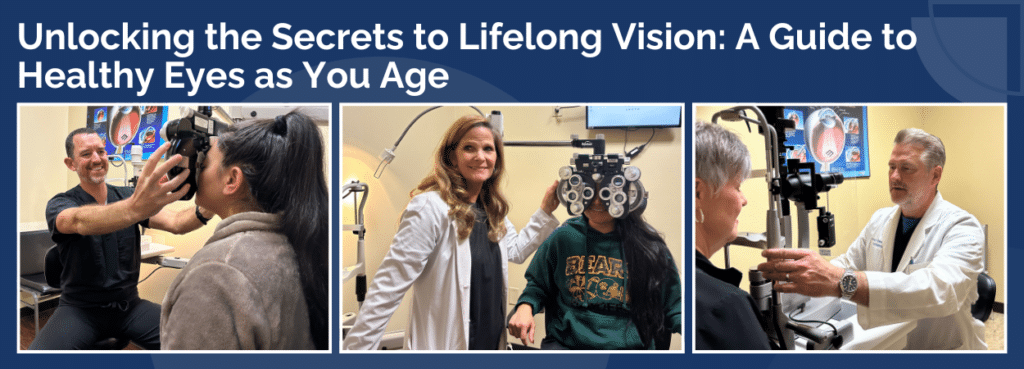Comprehensive Eye,LASIK,Premium Lens Options,Refractive Lens Exchange,Uncategorized

May is Healthy Vision Month, a time to raise awareness about the importance of maintaining healthy eyesight throughout our lives. At Sweeney Eye Associates, we understand the significance of proactive eye care, especially as we age and face unique challenges to our vision.
Let’s explore the key concerns for eye health at different stages of life, discover effective ways to combat these issues, and explore into how Sweeney Eye Associates can enhance your eye health and vision through advanced procedures.
20s and 30s: Protecting Your Vision for the Future
In our 20s and 30s, eye health might not be a top priority. However, this is a crucial time to establish good habits that will benefit us in the long run. Some key concerns during this phase include digital eye strain due to excessive screen time, UV exposure, and lifestyle habits that can impact eye health.
Advice From Our Team:
1. Practice the 20-20-20 Rule:
Every 20 minutes, take a 20-second break, and look at something 20 feet away to reduce digital eye strain.
2. Wear UV-Protective Eyewear: Shield your eyes from harmful UV rays by wearing sunglasses with adequate UV protection whenever you’re outdoors.
3. Eat a Balanced Diet and Quit smoking: Include foods rich in antioxidants, vitamins A, C, and E, and omega-3 fatty acids to support overall eye health. Avoid smoking as it negatively effects eye health.
Enhancing Vision: There is no better time to experience visual freedom than now! Many individuals in their 20s and 30s opt for LASIK or other refractive procedures to reduce dependence on glasses or contact lenses and enjoy clearer vision. If you want to correct refractive errors like nearsightedness, farsightedness, and astigmatism request a LASIK Consultation Today.
Embracing Youthful Beauty: Stay ahead of fine lines and wrinkles with our Oculoplastic procedures Oculoplastic procedures such as fillers, injections, or CO2 laser resurfacing all of which may improve aesthetics and functionality around the eyes.
40s and 50s: Addressing Age-Related Changes
As we enter our 40s and 50s, age-related changes start becoming more noticeable. Presbyopia, the loss of near focusing ability, becomes common during this time and is why many of our patients reach for readers. Dry eyes may become more of an issue due to changing hormones, and your face and eyes may begin showing more signs of aging such as wrinkles and droopy skin.
Advice From Our Team:
1. Get Regular Eye Exams: Schedule comprehensive eye exams at least every two years or as recommended by your eye care professional to detect and address age-related issues early.
2. Consider Corrective Lenses or Refractive Surgery: If you experience difficulty reading or focusing on close objects, speak to your eye care provider about options like reading glasses, multifocal lenses, or refractive surgery for permanent clearer vision.
3. Manage Systemic Health and Nutrition: Maintain a healthy lifestyle by managing conditions like diabetes and high blood pressure, as they can impact eye health. Additionally, prioritize nutrition by staying hydrated and consuming a balanced diet rich in antioxidants, vitamins, and minerals essential for eye health. Incorporate foods like leafy greens, colorful fruits and vegetables, fish rich in omega-3 fatty acids, and nuts and seeds to support your vision as you age. And if you smoke, now is the time to quit!
Enhancing Vision: Visual freedom is still within your reach! If you aren’t a candidate for LASIK, Refractive Lens Exchange (RLE), also known as lens replacement surgery, is an option for individuals in their 40s and 50s who are developing presbyopia or have significant refractive errors. RLE can reduce or eliminate the need for glasses or contacts and improve overall vision quality. It also eliminates the need for cataract surgery as you age!
Aging Beautifully: You can be proactive in heading off fine lines and wrinkles. We offer Oculoplastic procedures such as fillers, injections, or CO2 Laser resurfacing all of which may improve aesthetics and functionality around the eyes.
60s and Beyond: Navigating Age-Related Eye Diseases
In our 60s and beyond, the risk of age-related eye diseases such as glaucoma, macular degeneration, and diabetic retinopathy increases. Additionally, many individuals start to experience symptomatic cataracts. These conditions can significantly impact vision and quality of life if left untreate
Advice from our Team
1. Early Detection and Treatment: Attend regular eye exams, as early detection and timely treatment can help manage or slow the progression of age-related eye diseases.
2. Lifestyle Modifications: Quit smoking, manage cholesterol levels, and maintain a healthy weight to reduce the risk of developing eye diseases associated with aging such as Glaucoma, Retinal Conditions, and more.
3. Adaptation and Support: Consider low vision aids and technologies if you experience vision loss. These tools can help maintain independence and improve quality of life.
Enhancing Vision: For individuals in their 60s and beyond, cataracts may become a concern. Cataract surgery, a safe and effective procedure, replaces the cloudy lens with a clear artificial lens, restoring clear vision.
Aging Beautifully: It’s never too late to seek the services of an oculoplastic surgeon. Individuals in their 60s may continue to look for ways to rejuvenate their appearance. When non-surgical procedures such as fillers, injections, or CO2 Laser resurfacing aren’t enough, we offer surgical options such as Blepharoplasty for Droopy Eyelids.
We’re Here When You Need Us!
As we celebrate Healthy Vision Month, let’s commit to prioritizing our eye health at every stage of life. Whether you’re in your 20s or enjoying your golden years, proactive measures, regular eye care, and advanced vision enhancement procedures can pave the way for a vibrant and clear-eyed future.
Sweeney Eye Associates offers a variety of surgical and lens options, with the potential to correct your sight at all ranges of vision.





